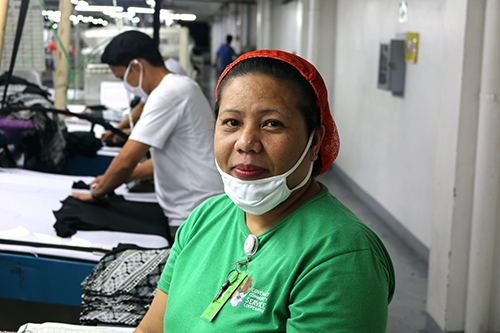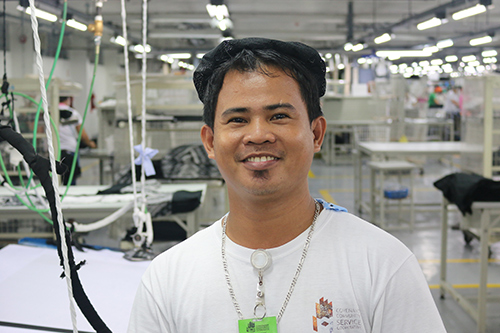News
Workplace family planning project empowers women, and is good business
- 07 July 2017
News
CAVITE, Philippines – Seven months ago, Mae Esparcia, 30, gave birth to her first child, Maria Carmen. After her delivery, Ms. Esparcia, a garments factory worker at Hamlin Industrial Corp. in Cavite, Philippines, decided to start using contraceptive pills, which she received for free – from her workplace.
“I’m taking the pills so that I avoid getting pregnant so soon after the birth of my daughter,” she told UNFPA, which is partnering with Hamlin to support the programme, part of efforts to expand access to family planning services in the Philippines.
Millions of other Filipino women would also like to plan the timing and the size of their families, but are not able to do so. In the Philippines, 18 per cent of married women have an unmet need for family planning, according to the 2013 Philippine National Demographic and Health Survey.

Ms. Esparcia explained that the ability to plan the timing and size of her family is important to her. “If I were to have another child so that Maria Carmen has a brother or a sister, I’d like to wait five years before getting pregnant again.”
The workplace family planning programme enables her and other employees – of the company’s 2,300 employees, 76 per cent are women – to take control of their futures. It’s also good business: High employee turnover and significant absences due to unplanned pregnancies affect Hamlin’s business.
Since June 2015, UNFPA has mentored Hamlin’s programme managers and family planning trainers, and facilitated the adoption of the programme’s policies. UNFPA also supplies some of the programme’s contraceptives. Participation in the programme is entirely voluntary and confidential.
In 2016, the programme enabled 88 per cent of workers to use modern family planning methods, including condoms, contraceptive pills, injectables, intrauterine devices and implants. Similarly, the programme provided counselling to 92 per cent of women who gave birth in 2016, who then decided to use modern family planning methods.
“I want my two children to have a good education and a good life,” said Rowena Alberto, 40, who has been using family planning services for 11 years, most recently through Hamlin’s programme. Like Ms. Esparcia, she inspects garments at Hamlin’s sprawling factory in Cavite, south of Manila.
“Life can be hard. People earn just enough to take care of their family. You cannot do that if you’re getting pregnant every year,” she said. She went on to explain that it was initially her husband who suggested using family planning services. “He did not want a lot of children.”

This sentiment is shared by Jeffrey Austria, 29, who irons garments at Hamlin’s factory and has been using the company’s family planning services since January 2016. “It’s very stressful and difficult to have many children. Parents can get depressed,” said the father of two. “If you have fewer children you can support them and really give them a better life.”
By the end of 2018, Hamlin aims to ensure all of its employees have access to family planning information. The success of the programme will serve as a model for other companies.
Access to voluntary family planning is one of the most effective ways to stop the cycle of poverty for families and communities in developing countries. Yet in these countries, more than 214 million women and girls who do not want to get pregnant are not using safe and effective family planning methods.
On 11 July, a global summit in London will seek to renew countries’ commitment to expanding access to modern forms of contraception to an additional 120 million women – a goal set five years ago. The meeting will assess progress made, and focus on those who have yet to be reached.
Innovative programmes, like workplace family planning counselling and services, can play an important role in expanding access to those who need it most.
– Mario Villamor